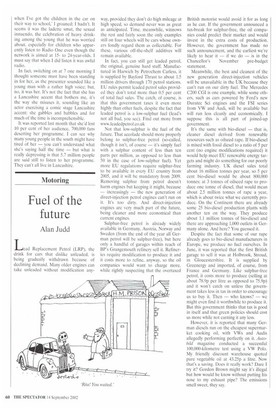Motoring
Fuel of the future
Alan Judd
Lcad Replacement Petrol (LRP), the drink for cars that dislike unleaded, is being gradually withdrawn because of declining demand. Many older engines can take unleaded without modification any
way, provided they don't do high mileage at high speed, so demand never was as great as anticipated. Time, meanwhile, winnows the rest and fairly soon the only examples still on four wheels will be cars whose owners fondly regard them as collectable. For these, various off-the-shelf additives will remain available.
In fact, you can still get leaded petrol, the original, genuine hard stuff. Manufactured in Harwich by Petrochem Carless, it is supplied by Bayford Thrust to about 1.5 million drivers through 170 petrol stations. EU rules permit leaded petrol sales provided they don't total more than 0.5 per cent of total fuel sales. The catch, of course, is that this government taxes it even more highly than other fuels, despite the fact that leaded petrol is a low-sulphur fuel (lead's not all bad, you see). Find out more from www.leadedpetrol.co.uk Not that low-sulphur is the fuel of the future. That accolade should more properly belong to sulphur-free petrol (so-called, though it isn't, of course — it's simply fuel with a sulphur content of less than ten parts per million, as opposed to less than 50 in the case of low-sulphur fuel). Yet more EU regulations require sulphur-free to be available in every EU country from 2005, and it will be mandatory from 2009. Removing sulphur from petrol doesn't harm engines but keeping it might, because — increasingly — the new generation of direct-injection petrol engines can't run on it. It's too dirty. And direct-injection engines are very much part of the future, being cleaner and more economical than current engines.
Sulphur-free petrol is already widely available in Germany, Austria, Norway and Sweden (from the end of the year all German petrol will be sulphur-free), but here only a handful of garages within reach of BP's Grangemouth refinery sell it. Refineries require modification to produce it and it costs more to refine, anyway, so the oil companies would want to charge more, while rightly suspecting that the overtaxed British motorist would avoid it for as long as he can. If the government announced a tax-break for sulphur-free, the oil companies could predict their market and would invest in the extra costs of production. However, the government has made no such announcement, and the earliest we're likely to hear it — if we do — is in the Chancellor's November pre-budget statement.
Meanwhile, the best and cleanest of the new generation direct-injection vehicles will be unavailable in the UK because they can't run on our dirty fuel. The Mercedes C200 CGI is one example, while some others, such as cars powered by Ford's new Duratec Sci engines and the FSI series from VW and Audi, will be available but will run less cleanly and economically. I suppose this is all part of joined-up government.
It's the same with bio-diesel — that is, cleaner diesel derived from renewable resources such as oilseed rape. If bio-diesel is mixed with fossil diesel to a ratio of 5 per cent (no engine modifications required) it would help meet EU renewable energy targets and might do something for our poorly farming industry. UK diesel sales total about 16 million tonnes per year, so 5 per cent bio-diesel would be about 800,000 tonnes; at 3 tonnes of oilseed rape to produce one tonne of diesel, that would mean about 2.5 million tonnes of rape a year, which is about twice what we currently produce. On the Continent there are already some 25 bio-diesel production plants with another ten on the way. They produce about 1.1 million tonnes of bio-diesel and there are approaching 1,000 outlets in Germany alone. And here? You guessed it.
Despite the fact that some of our rape already goes to bio-diesel manufacturers in Europe, we produce no fuel ourselves. In June, it was reported that the first British garage to sell it was at Holbrook, Stroud, in Gloucestershire. It is supplied by Greenergy and imported, of course, from France and Germany. Like sulphur-free petrol, it costs more to produce (selling at about 78.9p per litre as opposed to 75.9p) and it won't catch on unless the government takes less in tax in order to encourage us to buy it. Then — who knows? — we might even find it worthwhile to produce it. But this government thinks that tax is good in itself and that green policies should cost us more while not earning it any less.
However, it is reported that many German diesels run on the cheapest supermarket cooking oil, with VWs and Audis allegedly performing perfectly on it. Autobud magazine magazine conducted a successful 100,000-kilometre test using a VW Polo. My friendly discount warehouse quoted pure vegetable oil at 43.25p a litre. Now that's a saving. Does it really work? Dare I try it? Gordon Brown might say it's illegal but how would he know without putting his nose to my exhaust pipe? The emissions smell sweet, they say.










































































 Previous page
Previous page